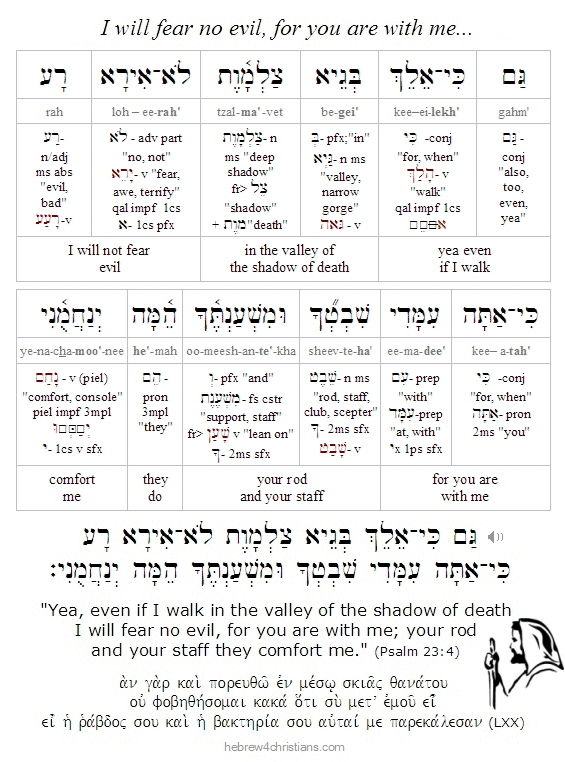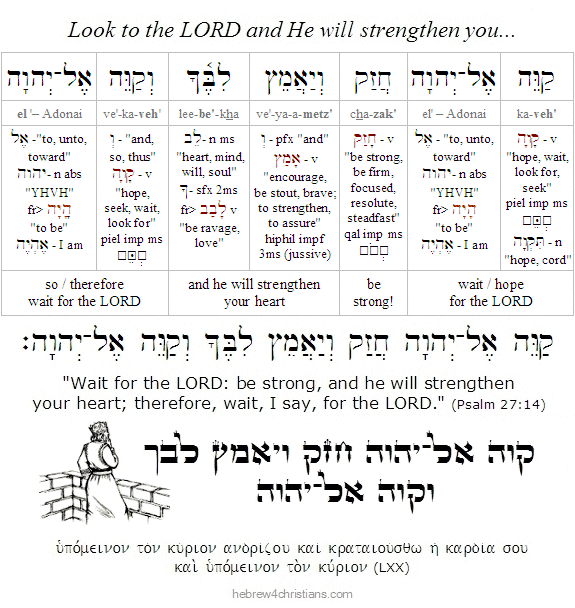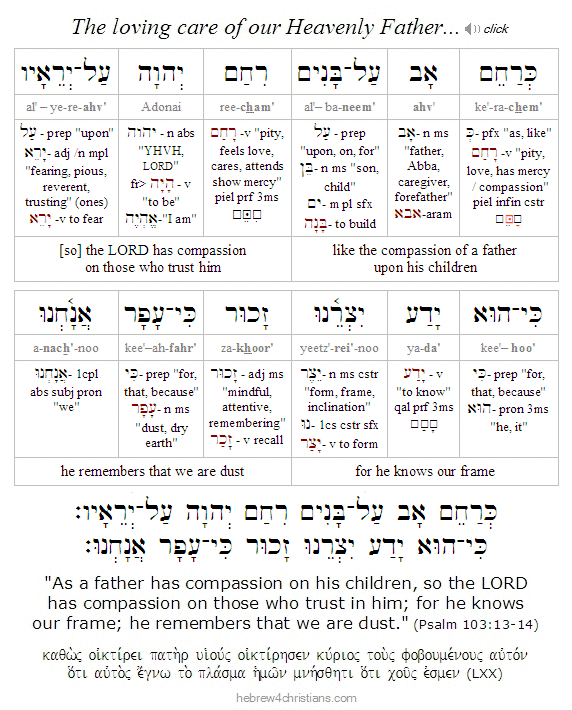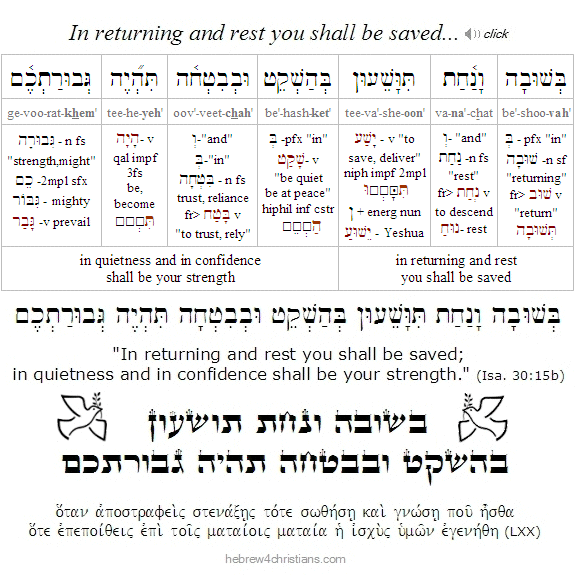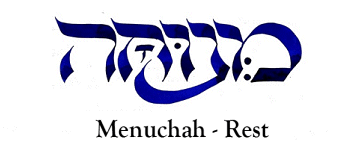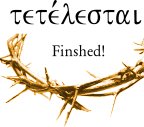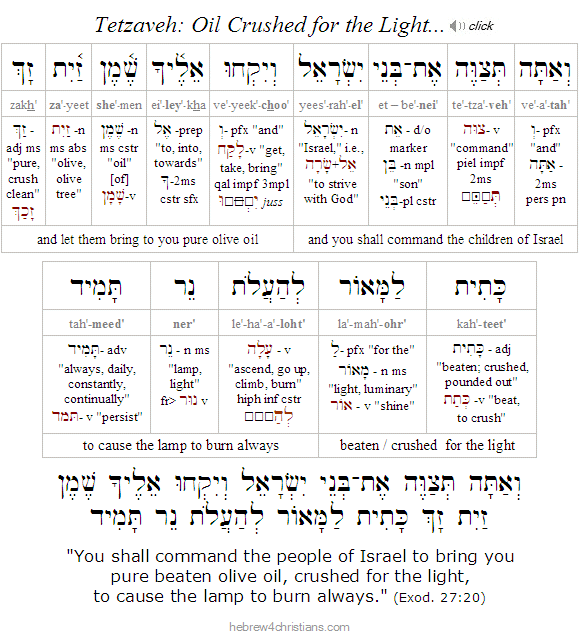|
March 2025 Updates (continued)
Note: If any page content appears to be missing, please refresh the page...
Intercession and Incense...
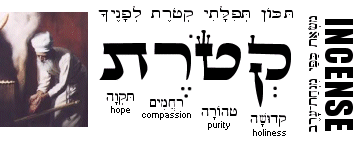
The following is related to this week's Torah reading, parashat Tetzaveh...
03.06.25 (Adar 6, 5785) The last item described in the Mishkan (i.e., the "Tabernacle") was a "Golden Altar" (הַמִזְבַּחַ הַזָּהָב) that was to be placed in the Holy Place just before the veil separating the Holy of Holies (parochet). Every morning and evening the High Priest would burn sacred incense on this altar (symbolizing prayer and intercession), and the blood of atonement was also applied there during the Yom Kippur service (Exod. 30:6-10).
The sages say that the word "incense" – i.e., ketoret (קְטרֶת) – can be thought of as an acronym of the words kedushah (קְדוּשָׁה), "holiness," tahorah (טָהֳרָה), "purity," rachamim (רַחֲמִים), "compassion," and tikvah (תִקוָה), "hope," characteristics that marked the passion of Yeshua who interceded for us as he offered his blood before the heavenly kapporet as our High Priest of the new covenant. Indeed, the word ketoret comes from a root word (קטר) that means to offer sacrifice, further alluding to the intercession of Messiah on our behalf (Heb. 7:25). Disciples of Yeshua are likewise called priests of God (Rev. 1:6; 1 Pet. 2:5), and our prayers and service are regarded as a "sweet-smelling savor" offered to the Lord (Rev. 8:4). As it says in the Psalms: "Let my prayer be counted as incense before You; the lifting up of my hands as the evening sacrifice" (Psalm 141:2).
Hebrew Lesson
Psalm 141:2 Hebrew reading:
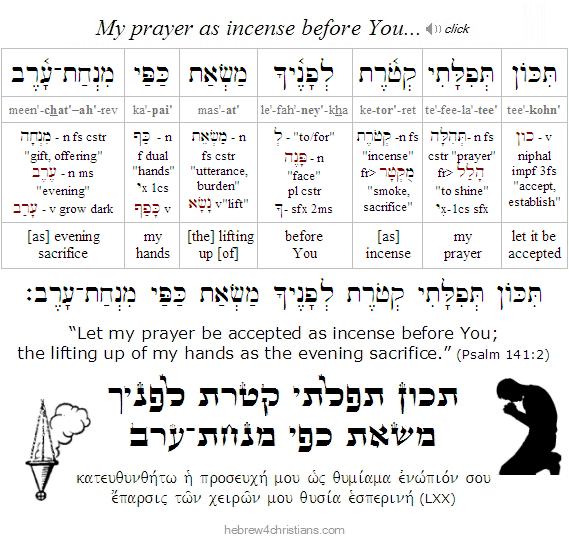 |
Note: The Talmud states that the sacred incense recipe was made of eleven different spices, ten of which had pleasant fragrance, but one of which (i.e., galbanum) had an unpleasant odor. The sages have said the presence of an unpleasant odor in the sacred mixture represents our laments, our cries, and confession for the foulness of our sins.
The Lord our Refuge...
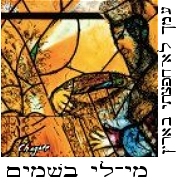
I happened to be reading Psalm 7 the other day and took a few notes about the its opening words... This may be of interest to those of you who are learning Hebrew. Shalom.
03.06.25 (Adar 6, 5785) Psalm 7 begins with a word of musical direction, "shigayon" (שִׁגָּיוֹן), that likely means "in a wandering" or "plaintive" style (from a root word that means to "wander" or to "muse"). David apparently composed these words while under duress, as he was being persecuted by an adversary named "Cush, the Benjamite," thought either to be a member of King Saul's court or as another name for King Saul himself. At any rate, the psalm records David's heartfelt lament and appeal to God to be vindicated and delivered from his enemies, and it expresses his confidence that God alone is his Savior: "My shield is with God, who saves the upright in heart" (Psalm 7:10).
The psalm itself begins, "O Lord my God." In Hebrew: "Adonai Elohai" (יהוה אלהי). This can be read, "O Lord, you are the God of me." David's focus is on the one who says "I am the Lord your God" (אנכי יהוה אלהיך), the first words of covenant with God. "I am the Lord your God" are the opening words of the very First Commandment (Exod. 20:2). It is the call of God to be in relationship with him. We begin here. "Our heavenly Father..."
The sages note that the opening words: "O Lord my God" (יהוה אלהי) has the same numerical value as the word "chesed" (חסד), which means love, mercy, or "lovingkindness." God's name means "compassion" to the trusting heart. "Like a Father who has pity on his children, so the Lord has compassion on those who revere him" (Psalm 103:13).
"In you I trust." In Hebrew the phrase "bekha chasiti" (בְּךָ חָסִיתִי) means "you are my refuge, my "hiding place" in the storm. The root of the verb means to shelter, to show pity, and to console. "God is our refuge and strength, "in troubles he is found near" (בצרות נִמְצָא מאד). Note that phrase. God permits troubles in our lives to move us to seek his love and healing. These are the "troubles of love" (יסרים של אהבה) I've written about elsewhere.
So David opens his prayer saying, "O Lord, you are my God; I take refuge in you..." I paraphrase: "O Lord, you alone are my God, my help, my strength... I come to the place of your refuge; I seek myself in your heart and love..." These are words of deep trust and humility. "Without you I can do nothing" (John 15:5). Humility is the attitude of trust, or "bittachon" (בטחון). It is total reliance on God as his child, secure in his mercy and love.
Therefore David cries out, "O save me!" In Hebrew: "hoshiani" (הוֹשִׁיעֵנִי). The form of the verb "yasha" (ישע) affirms that only God can deliver him, only God can rescue him. God alone controls the future, and therefore this is a plea to be set free from anxiety and fear. The name "Jesus" comes from this word (ישוע). The parallel word "hatzileni" (הַצִּילֵנִי), which David added to his appeal to God, means "deliver me," from a root (נצל) that means to be rescued from captivity. This idea here is that God alone has the power to overcome David's enemies, to those who pursue him, and to release him from their hold over his soul.
Hebrew Lesson
Psalm 7:1 Hebrew reading:
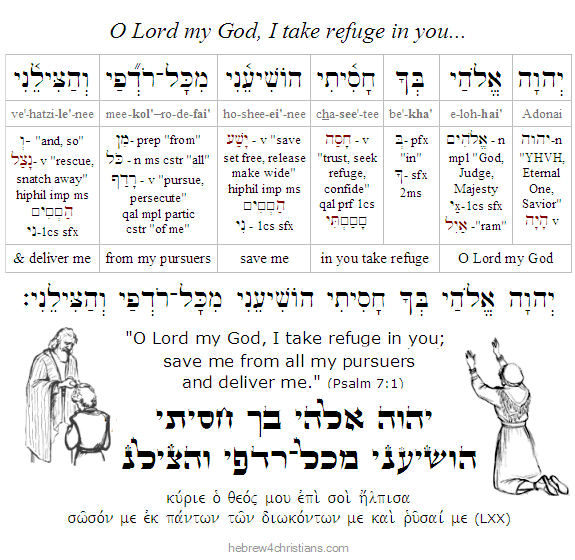 |
Trusting God's Providence...
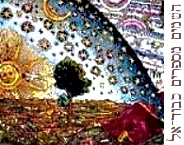
03.06.25 (Adar 6, 5785) The Scriptures teach us that creation is "teleological," which means that it is "going someplace," and that there is order and purpose to our existence. Your life is not adrift in a random universe that is destined to ultimately fade away but is grounded in the Divine Mind and Will that personally supervises and pervades all things. A lack of emunah (faith) has been likened to a passenger flying on an airplane who doesn't believe there is a pilot in the cockpit... Faith in the LORD believes that a single supreme, all-knowing, all-powerful and benevolent spiritual Power directs all things, and that God is the beginning, middle, and end of all conscious meaning, truth, and substance, as it is written: כִּי הַכּל מִיָּדוֹ הַכּל בּוֹ וְהַכּל לוֹ הוּא, "For from him and through him and to him are all things" (Rom. 11:36). A life of faith in the one true God imparts the blessing of shalom (inner peace) and assures the heart that all shall be made well by the love of God. Everything God does is for the very best, and there are no exceptions to this truth (Rom. 8:28).
Our faith that everything God does is for the best is not some rationalization that denies or minimizes the suffering we encounter in life, but is an affirmation that there is an unseen (though knowable) good at work that ultimately will heal us and comfort our shattered hearts... The phrase gam zu l'tovah (גַּם זוּ לְטוֹבָה) is an affirmation that "this too is for good," and that this "this" includes the various challenges and struggles we face during our days of sojourn here on this earth. Every "down" in life prepares us for an "up," with the ultimate end being beatitude and everlasting joy. Challenges draw us closer to God, igniting our hearts to cry out for his Presence and blessing. Even death itself is a passageway to eternal life (Psalm 16:10; 49:15; 1 Cor. 15:12-58). בַּעֲצָתְךָ תַנְחֵנִי וְאַחַר כָּבוֹד תִּקָּחֵנִי - "You guide me with your counsel, and afterward you will receive me to glory" (Psalm 73:24).
By faith "we know that if the 'tent' that is our earthly home is destroyed, we have a building from God, a house not made with hands, eternal in the heavens" (2 Cor. 5:1). God is our good Shepherd who leads us along the byways of the desert of this world (Psalm 23:4). In God's presence is total and absolute joy; at his right hand there are pleasures forever (Psalm 16:11). As it is written in the sacred testimony of the prophets: "No eye has seen, nor ear heard, nor the heart of man imagined, what God has prepared for those who love him" (Isa. 64:4; 1 Cor. 2:9). The LORD "will wipe away every tear from our eyes, and death shall be no more, neither shall there be mourning, nor crying, nor pain anymore, for the former things have passed away" (Rev. 21:4, Isa. 25:8). God carefully foresees your way and prepares a place for you (John 14:1-3); he has ready a precious white stone with your "hidden" name inscribed (Rev. 2:17); the table is being set and your place has been reserved... There is great consolation and unimaginable blessing to come.
So be encouraged, friend. You do not need to struggle alone – afraid that you might be swallowed up in your infirmities... God knows the groan of your struggle and invites you to find solace and strength in Him. "It is enough to open your heart the smallest amount - even the width of a pin - to repent, so that you feel a stab within your heart, like a piercing sting in living tissue, not like a needle thrust into dead flesh" (Menachem Mendel of Kotzk). Bittachon (בִּטָּחוֹן) is a Hebrew word that means trust in God... Those who have bittachon do not worry about the future because their faith permeates their heart and mind, enabling them to surrender their cares and burdens to the Lord.
Hebrew Lesson
Psalm 23:4 Hebrew reading (click):
Seeing beyond the Seen...
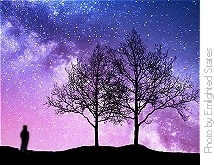
"Faith is the assurance that the best and holiest dream is true after all." - Frederick Buechner
03.06.25 (Adar 6, 5785) Yeshua told us: "Blessed are those who have not seen and yet have believed" (John 20:29). Despite the struggle of this life - our sorrows, pains, and even death itself - we believe in God's love and promise for us, even if we do not presently see the fulfillment of our hope, just as Abraham believed the promise that he would be the father of an innumerable multitude long before he saw any sign of its fulfillment.
Abraham "believed the impossible" and "hoped against hope" (παρ᾽ ἐλπίδα ἐπ᾽ ἐλπίδι), meaning that hope kindled within him even though there was nothing to see in the realm of the natural -- he believed in an unseen good; he trusted in the One who gives life to the dead and who "calls into existence the things that do not exist" (Rom. 4:17).
The Scripture comments: "He did not weaken in faith when he considered his own body, which was as good as dead (since he was about a hundred years old), or when he considered the deadness of Sarah's womb. He did not stumble over the promise of God through unbelief but was strong in faith, and gave glory to God, fully persuaded that God was able to do what he had promised, and that is why his faith was counted to him as righteousness" (Rom. 4:19-22).
Likewise we are called to believe in an unseen good, an unimaginably wonderful destiny for our lives, as it says, "Things no eye has seen, nor ear heard, nor mind imagined, are the things God has prepared for those who love him" (1 Cor. 2:9). Faith does not use natural reason or the evidence of the senses to see the unseen, but it "believes to see" through "eyes of the heart" to know the hope of God's calling and to attain the blessing (Eph. 1:18).
Faith in God's love comes from a different source and has a different means of apprehension than human wisdom, so that no matter how things might appear in this fallen world, the LORD God may be known and trusted to work all things for our ultimate good. "Blessed are those who have not seen and yet have believed." Amen.
Hebrew Lesson
Psalm 27:14 Hebrew Reading:
Receiving True Freedom...
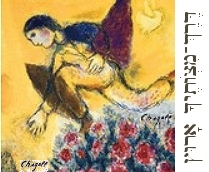
03.05.25 (Adar 5, 5785) "If the Son shall set you free, you shall be free indeed" (John 8:36). The sages say, "Being free means that I am in the place I am supposed to be." In other words, freedom means surrendering, accepting, and yielding to God's path of blessing for you. This a place of great spiritual contentment where you are liberated from the slavery of fear and disappointment. Yeshua lived in this freedom, since He completely yielded Himself to His father's daily care (John 5:19; 8:29; 14:10).
Some anxious people say that we first come to God by faith alone, but then we are responsible to keep God's law and to submit entirely to him. The problem here is the language. It is all of faith that we both come to him and live in accord with his heart and will. The work we do is the work of faith, or the "obedience of faith." As Yeshua explained to the rabbis of his day, "This is the work of God, that you believe in the one God sent" (John 6:29). If we truly believe in the Lord and live in His presence, if we truly seek to walk with him, the matter of obedience to the law is somewhat moot... His life and heart "within us" imparts the grace we need to fulfill his will. It is our heartfelt relationship with the Lord that is the goal and deeper meaning of the law (Rom. 13:8).
Surrendering yourself to God's care is also the means of finding self-acceptance. God knows all your sins and has paid for them upon the cross, and therefore His love for you is the basis for which you can properly forgive and accept yourself... A Yiddish proverb reads, "If I try to be someone else, who then will be like me?" When you die, God won't ask why you weren't more like Moses, Elijah, etc., but rather, why you weren't more like the person He created you to be. Live with all your heart awake to Him.
No one else can do the things you are called to do, and therefore God created you as a distinct individual who reflects His glory in a unique way... "To the one who conquers I will give a white stone, with a new name written on the stone that no one knows except the one who receives it" (Rev. 2:17). Those who follow Yeshua can intellectually understand and emotionally trust that God is working all things together for good in their lives (Rom. 8:28).
Hebrew Lesson
Psalm 103:13-14 reading (click):
The Strength of God's Peace...
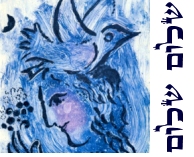
I don't need to understand as much as I need to trust. How my sins were taken away at the cross is a mystery, though I need to believe that God loves and heals me. What good is knowledge - even of things divine - without comfort? The struggle is to trust the heart of God - for everything - and especially for what breaks your heart...
03.05.25 (Adar 5, 5785) The ultimate question is whether you feel "safe" with the truth of who you really are... When you are all alone, in a moment of still silence, when the entire world is asleep and suspended, what is the message of your heart's cry? Are you okay? Do you trust who you are or what is happening to you, or do you experience anxiety, a sense of lostness, inner pain?
Comfort is found in God's grace. His promise is given to the sick at heart, to those who understand their need for a physician (Matt. 9:12). Since there is nothing about you to commend before God, you are made free to abandon yourself to the divine love. This is the "Name of the LORD," after all, and your heart's cry for love is a "prayer" uttered in that Name.
Your heavenly Father sees in secret (Matt. 6:6). Consider the birds of the air; they are unreflective, alive in the atmosphere of God's care. What a great blessing to let go of your fear; what sweet relief! Surrender to the truth of your helplessness; rejoice that you are "poor in spirit," and discover that yours is the Kingdom of Heaven (Matt. 5:3).
So don't give up your faith! The Lord will give strength to his people; the Lord will bless his people with peace. There is hope for your future. God has promised to be with you to the end, leading you to the place where your heart will forever be satisfied in his love.
Hebrew Lesson
Psalm 29:11 Hebrew Reading:
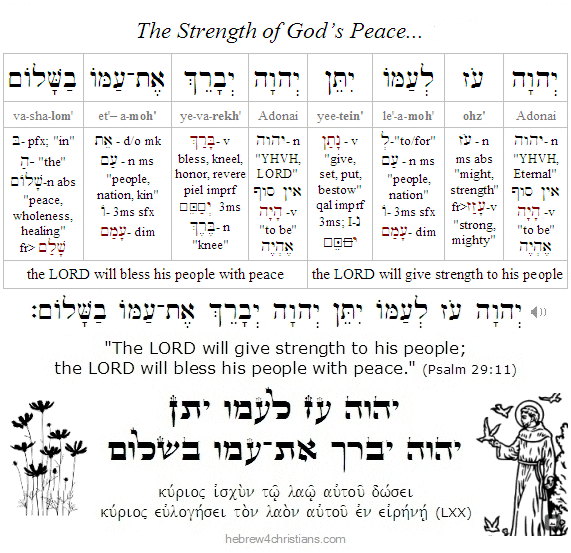 |
The Place of His Name...

03.04.25 (Adar 4, 5785) The revelation of the Mishkah (Tabernacle) presents a great mystery. God brings us out of Egypt, delivers us from slavery, carries us through various trials, all in order to be "our God" (אֱלֹהֵינוּ), and that means being in relationship with Him, brought to a place of conscious service by being made alive to His glorious reality that is hidden beneath the superficial appearance of things. Among other things, our freedom (חוֹפֶשׁ) means being set free from the vanity and illusions of this world by means of God's redeeming and atoning love. "In God's light we see light" (Psalm 36:9).
Just as the physical Mishkan was intended to accompany us in our journey to the promised land, it was always meant to represent a "pattern" (תַּבְנִית) or parable -- symbolizing a deeper design, namely God's inner light and presence within the heart of faith. Hence it says in the Torah, "Let them make for Me a holy place (מִקְדָּשׁ) so that I may dwell within them (וְשָׁכַנְתִּי בְּתוֹכָם)", that is, within the midst of their hearts (Exod. 25:8). It is the heart that is to be the place where God's presence is manifest...
This "pattern" foretold and revealed Yeshua as well, for He embodies the true inner meaning of the Mishkan and invites us into His heart for communion with God. Indeed, Yeshua is ha'makom (הַמָּקוֹם), "the Place of God," and in his life we find our redemption and atonement. Attired in the humility of the High Priest during the Yom Kippur avodah, Yeshua identifies with his people and presents the blood of atonement in the inmost sanctum of God on our behalf. His heart is torn open for us in intercession and He will never leave nor forsake us.
Our lives are meant to live within God's heart and presence. The Holy Spirit reveals the pattern and we experience freedom as we abide within his love (John 15:10; John 14:21). The center of his passion is revealed in the cloud above God's Ark, where the blood offered over the shattered tablets of our lives, and it is there that the voice of His intercession is eternally uttered on our behalf (Exod. 25:22; Luke 23:34; Mark 15:33-38; Matt. 27:51).
Hebrew Lesson
Psalm 23:6 reading (click):
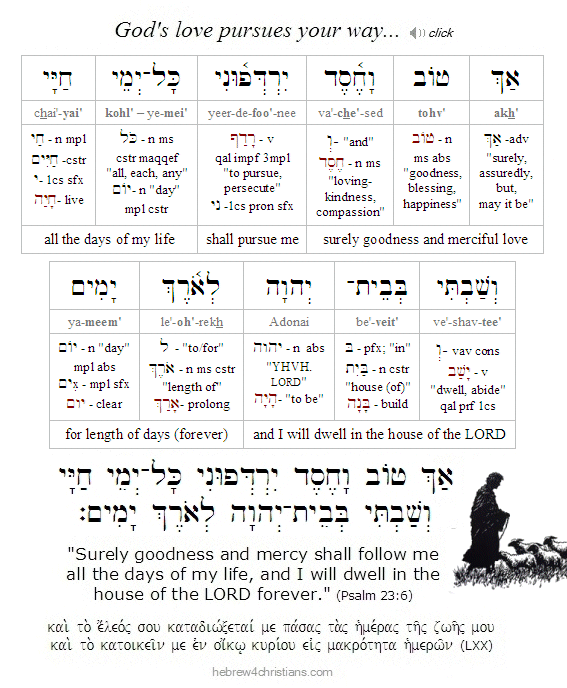 |
Names upon his Heart...
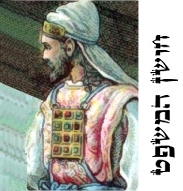
The following is related to this week's Torah reading, parashat Tetzaveh...
03.04.25 (Adar 4, 5785) The two onyx stones attached to the shoulder pieces of the High Priest's vest (i.e., ephod: אֵפד) were meticulously inscribed with the names of the twelve tribes of Israel: "Take two onyx stones, and engrave on them the names of the sons of Israel, six of their names on the one stone, and the names of the remaining six on the other stone, in the order of their birth. As a jeweler engraves signets, so shall you engrave the two stones with the names of the sons of Israel. You shall enclose them in settings of gold filigree. And you shall set the two stones on the shoulder pieces of the High Priest's vest (i.e., ephod: אֵפד), as stones of remembrance for the sons of Israel. And Aaron shall bear their names before the LORD on his two shoulders for remembrance" (Exod. 28:9-12).
Likewise the twelve precious stones arrayed on the breastplate (i.e., choshen: חשֶׁן) that hung over the front of the High Priest's robe were inscribed with the names of the twelve tribes of Israel: "You shall make a breastpiece of judgment (i.e., choshen ha'mishpaht: חשֶׁן הַמִּשְׁפָּט) in skilled work... and you shall set in it four rows of three precious stones enclosed with gold in their settings. There shall be twelve stones with their names according to the names of the sons of Israel. They shall be like signets, each engraved with its name, for the twelve tribes... "So Aaron shall bear the names of the sons of Israel in the breastpiece of judgment upon his heart, when he goes into the Holy Place, to bring them to regular remembrance before the LORD" (Exod. 28:15-29).
The sages comment that just as a father carries his young child on his shoulders, or a shepherd his lamb, so the High Priest carried his people before the LORD in intercession. Similarly, at the cross Yeshua carried our names on his shoulders, bearing the burden of our sins on on breast as he cried out in prayer for us before the Father. As our great High Priest of the New Covenant, Yeshua "bore the judgment of the people upon his heart" as he made intercession for them (Isa. 53:12; Rom. 8:34).
Hebrew Lesson
Isa. 53:12b Hebrew reading:
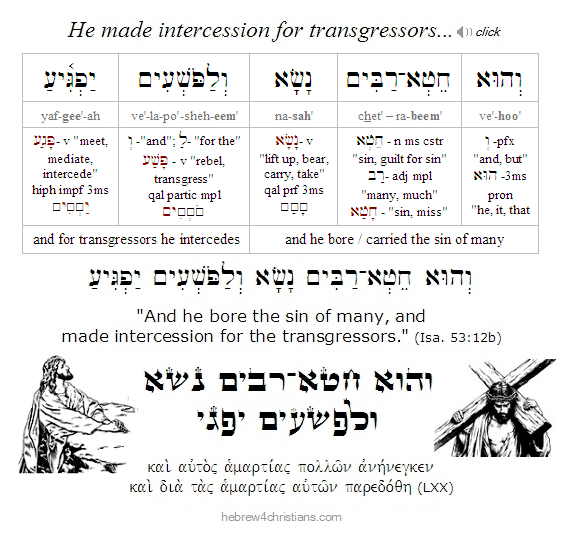 |
Looking for Home...
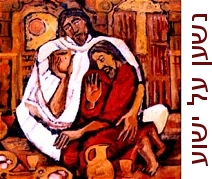
03.04.25 (Adar 4, 5785) Our faith in Yeshua brings us into collision with the world and its vanities. We are to be "crucified to the world," and therefore we seek matters above, out of sight of other men. "We do not look at things that are seen, but things that are unseen" (2 Cor. 4:18). We are estranged from the world because we look away from its attractions, heeding the promises of the Eternal Lord, longing for that place that transcends the temporal pleasures and fleeting dramas of this age. God has subjected this world to vanity yet has set "eternity within our hearts" so that we abide in hope.
Meanwhile we regard all things as they relate to the truth of spirituality as taught by our Lord. We recognize God's moral law and the voice of conscience that overrules the vagaries of man's self-serving laws, understanding that all that we say, do, and think will be judged upon our death before the truth of God. We therefore look askance at worldly politics and the machinations of the godless, understanding that we groan in this life and are burdened, earnestly desiring death to be "swallowed up" in life, and that we should be clothed in the immortality of eternal life (2 Cor. 5:4).
Just as you trust and accept that Yeshua was crucified for you, identifying with you, taking your place in judgment, exchanging his life for your own, so you trust and accept that you have been crucified with him, and that your old life was taken away and replaced with a new, indestructible nature of his resurrection life. In other words, a union is created where his "for me" is answered by my "with him." Χριστῷ συνεσταύρωμαι – "I already have been crucified in Messiah" (Gal. 2:20). Indeed the two go together: to trust in the finished work of Messiah for you is to trust in his finished work within you... When he died on the cross for you, which sins didn't he bear on your behalf? which remedy did he leave unfulfilled?
Hebrew Lesson
Psalm 73:24 reading (click):
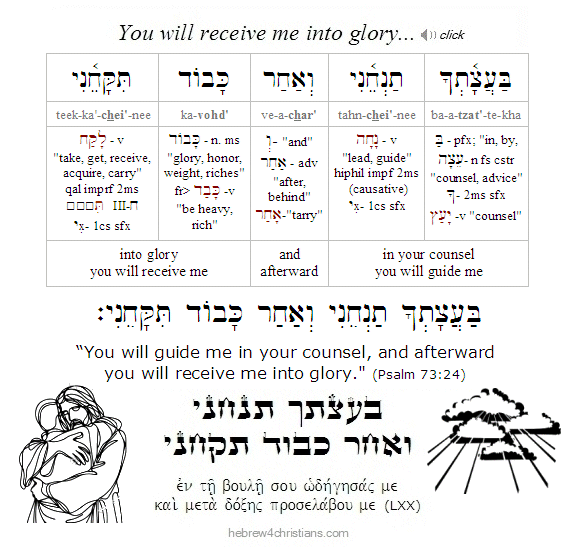 |
Rest for your Soul...
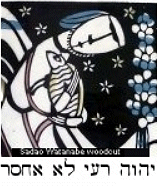
03.03.25 (Adar 3, 5785) Yeshua says, "Come to me, all who labor and are heavy laden, and I will give you rest. Take my yoke upon you, and learn from me, for I am gentle and lowly in heart, and you will find rest for your souls" (Matt. 11:28-29). When he said, "Live in me, and I will live in you" (John 15:4), he didn't insist you first be found worthy or good; no, he set no other condition than that of trust: "Now are you clean through the word which I speak" (John 15:3). The separation is gone; God has made the way past your shame. You are invited to come, so come just as you are, come without delay, but come trusting that you are entirely welcome because of who Yeshua is and what he has done for you...
O Lord, help us to live the newness of life that you so graciously offer to us.... help us to come to you and receive your rest. Amen.
Hebrew Lesson
Isa. 30:15b reading (click):
The Will to Believe...
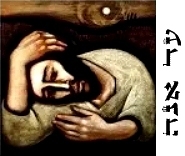
"When you have to make a choice and don't make it, that is in itself a choice." - William James
03.03.25 (Adar 3, 5785) The central issue of our spiritual life is the willingness to do God's will, or the willingness to believe, since these amount to the same thing.... Believe what? That God is real, that He has (personally) called you by name, that he has particularly redeemed you by Yeshua's own blood poured out for your sins, and that therefore that your identity and life are forever bound up with his mercy and truth... Perhaps this message seems too good to be true, and yet it is the heart's duty to take hold of hope and to refuse to yield to despair, as it is written: "Let not love and truth forsake you; bind them around your neck; write them on the tablet of your heart" (Prov. 3:3).
The spiritual danger is being "pulled apart" in opposite directions, dissipating the soul so that it will not be unified, focused and directed. Both loving and hating the good is a state of painful inner conflict, ambivalence, and self-contradiction. "Who can bring a clean thing out of an unclean? there is not one" (Job 14:4), yet this is our starting point: "I find it to be a law that when I want to do right, evil lies close at hand" (Rom. 7:21). We are often willing and unwilling, or neither willing nor unwilling, and this makes us inwardly divided, weak, fragmented, anxious, and "soulless." An honest faith that "wills one thing" binds the soul into a unity, or an authentic "self." As King David said, "One thing have I asked of the LORD, that will I seek after: that I may dwell in the house of the LORD all the days of my life, to gaze upon the beauty of the LORD and to inquire in his temple" (Psalm 27:4).
Healing a divided heart comes from making a decision: "Draw near to God, and he will draw near to you" (James 4:8). There are no conditions given here -- other than your raw need to connect with God for help. "Purify your hearts, you double-minded ones" (δίψυχοι, lit. "two-souled ones"); make up your mind and be unified within your heart: "How long will you go limping between two different opinions?" (1 Kings 18:21). You are invited to come; God has made the way; your place at the table has been set and prepared...
Our Heavenly Father "sees in secret.." As William James once said: "The deepest thing in our nature is this region of heart in which we dwell alone with our willingnesses and our unwillingnesses, our faiths and our fears" (James: Is Life Worth Living, 1896). Or as Albert Camus later wrote, "There is but one truly serious philosophical problem, and that is suicide. Judging whether life is or is not worth living amounts to answering the fundamental question of philosophy" (Myth of Sisyphus, 1942).
It is there, in the secret place of the heart, that the sound of the "knock" is either heard or disregarded (Rev 3:20); the stakes are nothing less than everything. May the Lord give us the willingness to do His will and the courage to believe in His love. And may God deliver us from doubt and from every other fear. May we all be strong in faith, not staggering over the promises, but giving glory to God for the miracle of Yeshua our LORD. May we all be rooted and grounded in love so that we are empowered to apprehend the very "breadth and length and height and depth" of the love of God given to us in Messiah, so that we shall all be filled with all the fullness of God (Eph. 3:14-19). Amen.
Hebrew Lesson
Proverbs 3:3 reading (click):
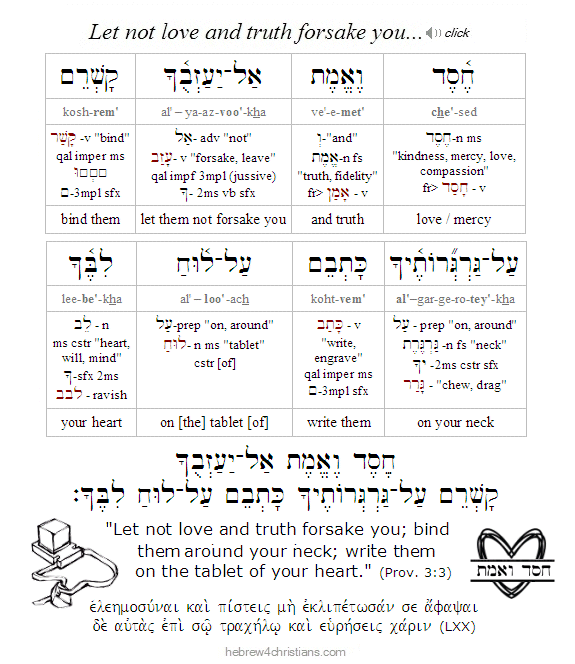 |
Crushed for the Light...
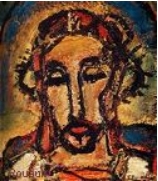
03.03.25 (Adar 3, 5785) From our Torah portion for this week (i.e., parashat Tetzaveh) we read: "You shall command the people of Israel that they bring to you pure olive oil "crushed" for the light, that an eternal or continual lamp (i.e., ner tamid: נר תמיד) may be set up to burn" (Exod. 27:20).
The Hebrew word for "pure" olive oil is zakh (זך), which refers to the clearest oil derived from squeezing out (or crushing) the very first drop from the choicest olive. The purest of oil was obtained by a process of "crushing for the light" (כתית למאור), which symbolizes the Light of the World, the One Crushed for our iniquities, the "Man of Sorrows" (אישׁ מכאבות) who offered himself up for our healing and illumination (Isa. 53:1-5).
Some things are seen only through the process of tribulation, breaking, and surrender. When we kindle this lamp, we are able to see the truth; we perceive how God's heart was crushed for the sake of our salvation...
Hebrew Lesson
Isaiah 53:5 Hebrew reading:
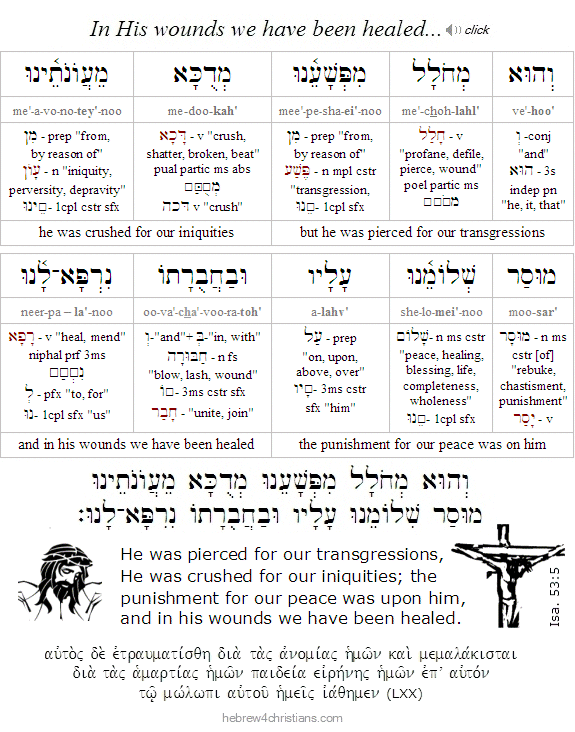 |
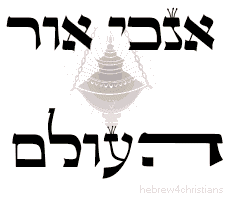
Behind the Sacred Veil:
Blood over Broken Tablets...

The following is related to this week's Torah reading, parashat Tetzaveh...
03.02.25 (Adar 2, 5785) The earthy Tabernacle (i.e., Mishkan) and its furnishings were "copies" of the heavenly Temple and the Throne of God Himself (see Heb. 10:1). Moses was commanded to make the Sanctuary according to the "pattern" revealed at Sinai (Exod. 25:9). As it is written in our Scriptures, "For Messiah has entered, not into holy places made with hands, which are representations (ἀντίτυπος) of the true things, but into heaven itself, now to appear in the presence of God on our behalf" (Heb. 9:24).
The centermost point (heart) of the earthly Tabernacle was the Ark of the Covenant (אֲרוֹן־הַקּדֶשׁ), a "three-in-one" box that contained God's Holy Word (i.e., the tablets of the Torah). As such, the Ark served as a symbol of kisei ha-kavod (כִּסֵּא הַכָּבוֹד), the Throne of Glory. The Ark stood entirely apart as the only furnishing placed in the "three-in-one" space called the Holy of Holies (קדֶשׁ הַקֳּדָשִׁים). Upon the cover of the Ark (i.e., the kapporet) were fashioned two cherubim (i.e., angel-like figures) that faced one another (Exod. 25:17-18). According to the Talmud (Succah 5b), each cherub had the face of a child - one boy and one girl - and their wings spread heavenward as their eyes gazed upon the cover (Exod. 25:20). This was the sacred place where the blood of purification was sprinkled during Yom Kippur, the Day of Atonement, and this is the Place (הַמָּקוֹם) that prefigured the offering of the blood of the Messiah, our eternal Mediator of the New Covenant. "For I will appear in the cloud over the kapporet" (Lev. 16:2; Exod. 25:22). As it is written in the prophet Isaiah: "I have blotted out your transgressions like a thick cloud and as a cloud your sins; return to me (שׁוּבָה אֵלַי), for I have redeemed you (Isa. 44:22).
Hebrew Lesson:
Isaiah 44:22 Hebrew reading:
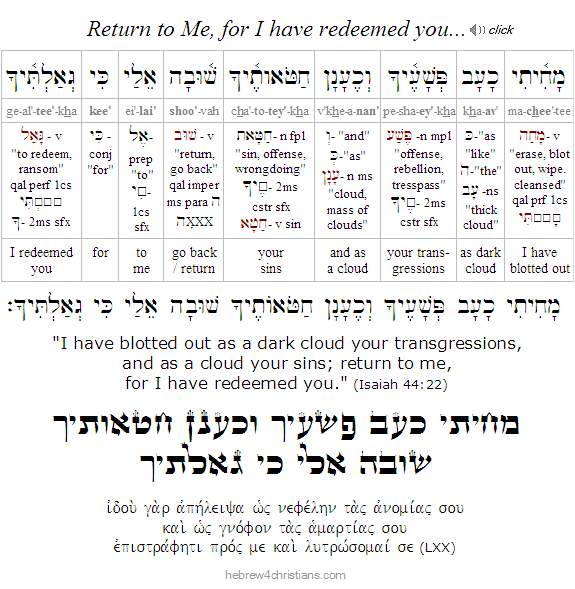 |
The central ritual of atonement given in the Torah is that of the anointed High Priest sprinkling sacrificial blood over the tablets of the law upon the kapporet (the "mercy seat") of the Ark of the Covenant - the Place where "Love and truth meet, where righteousness and peace kiss" (Psalm 85:10). It was from the midst of the surrounding cloud in the Holy of Holies that the Voice of the LORD was heard, just as it was in the midst of the surrounding cloud of darkness upon the cross that Yeshua cried out in intercession for our sins (Luke 23:44-46).
Just as Moses alone approached God in the thick clouds at Sinai to receive the revelation of the Altar as mediator of the older covenant (Exod. 24:15), so Yeshua, the Mediator of the New Covenant, went through his severest agony on the cross as the darkness covered the earth (Luke 23:44; Matt. 27:45).
Attending to God's Light:
Parashat Tetzaveh...
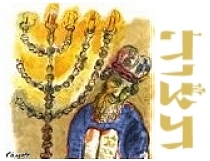
[ "All truth and understanding is a result of a divine light which is God Himself." - Augustine ]
03.02.25 (Adar 2, 5785) Shavuah tov, friends. Last week's Torah reading, parashat Terumah (תרומה), explained that God had asked for a "donation" (i.e., terumah) from the people for the sake of creating a portable, tent-like sanctuary called the Mishkan (משׁכּן), or "Tabernacle." God then showed Moses the pattern (תּבנית) according to which the Mishkan and its furnishings were to be made. First the Ark of the Covenant (ארון בּרית־יהוה) and its golden cover (called the kapporet: כּפּרת) would occupy an inner chamber of the tent (אהל) called the Holy of Holies (קדשׁ הקדשׁים). Within an adjoining chamber of the tent called the Holy place (הקדשׁ), a sacred Table (שׁלחן) would hold twelve loaves of unleavened bread (לחם פּנים) and a seven-branched Menorah (מנורה) would illuminate the tent. God gave precise dimensions of the tent with the added instruction to separate the Holy of Holies by a hanging veil called the parochet (פּרכת). The entire tent was to have a wooden frame (מסגּרת) covered by colored fabric and the hide of rams and goats. Outside the tent an outer court (חצר) was defined that would include a copper sacrificial altar (מזבח נחושת) and water basin (כּיּור נחשׁת). The chatzer, or outer court, was to be enclosed by a fence made with fine linen on silver poles with hooks of silver and sockets of brass.
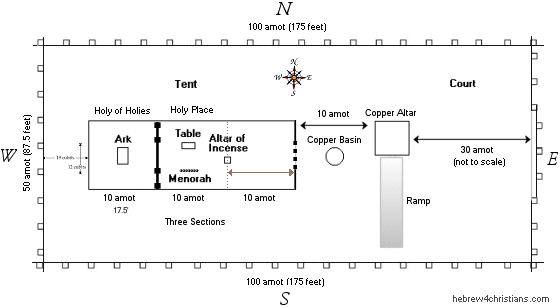 |
Our Torah reading for this week, parashat Tetzaveh (תצוה), continues the description of the Mishkan, though the focus shifts to those who will serve within it, namely the kohanim (כּהנים), or the priests of Israel. First Moses was instructed to tell the Israelites to bring pure olive oil (שׁמן זית זך) for the lamps of the Menorah, which the High Priest (הכּהן הגדול) was instructed to light every evening in the Holy Place. Next God commanded Moses to ordain Aaron and his sons as priests and described the sacred garments (בּגדי־קדשׁ) they would wear while they were serving in the Mishkan.
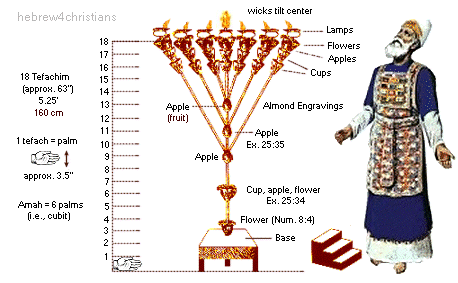 |
All priests were required to wear four garments – linen breeches, tunics, sashes, and turbans, but in addition to these the High Priest (Kohen Gadol) was to wear a blue robe that was decorated with pomegranates and golden bells. Over this robe, an ephod (אפוד) – an "apron" woven of gold, blue, purple, and crimson – was to be worn, upon which was attached a "breastpiece" (חשׁן) inlaid with precious stones inscribed with the names of the 12 tribes of Israel. The ephod also contained a pouch holding two unique gemstones called the urim v'tummin (אורים ותומים), usually translated as "lights and perfections." According to the Targum Jonathan, when a matter was brought to the High Priest for settlement, he would sometimes hold the urim (from אוֹר, "light") and tummin (from תָּם, "integrity" or "completeness") before the Menorah in the Holy Place and the Shekhinah would light up various letters inscribed on the gemstones to reveal the will of God. Finally, the High Priest would wear a golden plate (i.e., tzitz zahav: צּיץ זהב) engraved with the words, "Holy to the LORD" (קדשׁ ליהוה) upon the front of his turban.
The priests were to be ordained in a seven-day consecration ceremony that involved washing, dressing, and anointing them with oil and blood, followed by the offering of sacrifices. The priests were instructed to present burnt offerings twice a day upon the copper altar. The portion ends with a description of the Golden Altar (מזבּח הזהב) also called the Altar of Incense (מזבּח הקטרת) upon which incense (i.e., ketoret: קטרת) was offered twice a day by the priests when the Menorah lamps were serviced. In addition, the blood of atonement was to be placed on its corners once a year, during the Yom Kippur ritual.
<< Return
|
|















